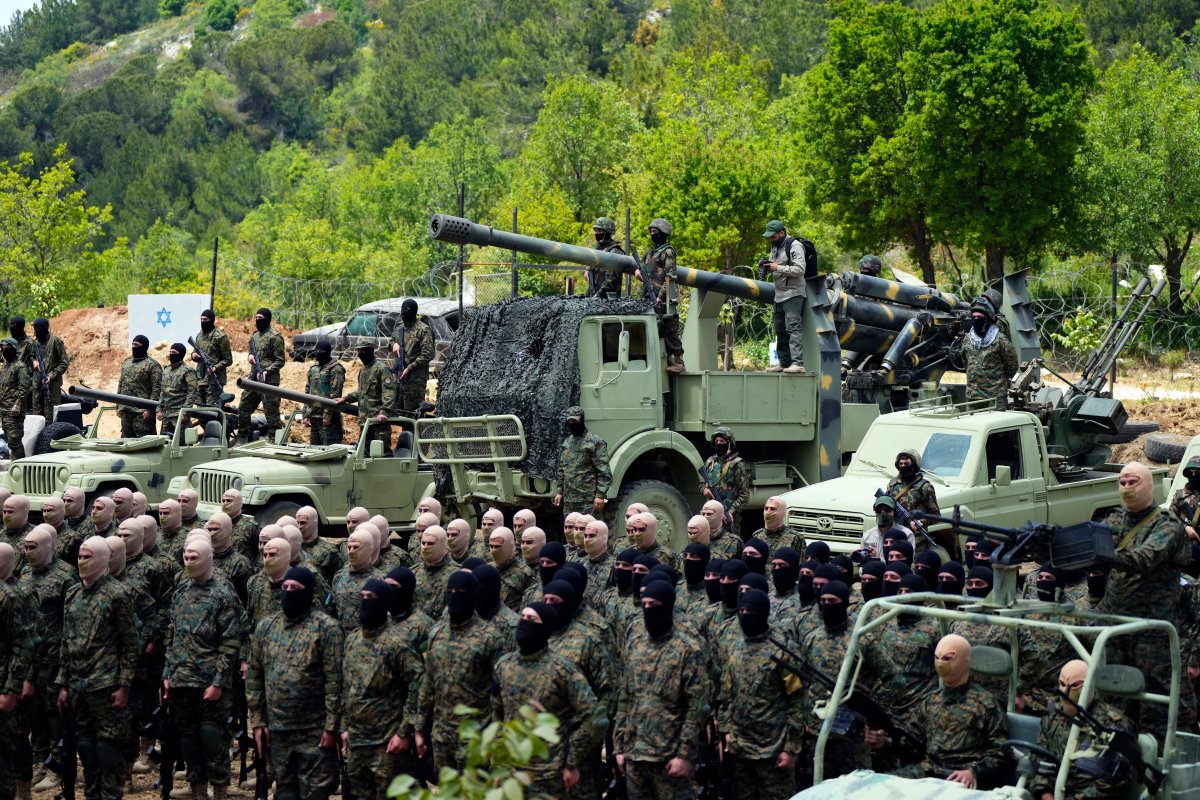The Impact Of Israeli Intelligence On The Hezbollah-Lebanon Conflict In The South

Table of Contents
Israeli Intelligence Gathering and Hezbollah's Activities
Surveillance and Monitoring
Israeli intelligence employs a sophisticated array of methods to monitor Hezbollah's activities, weapons deployments, and cross-border movements. These methods include:
- Satellite imagery: High-resolution satellites provide continuous surveillance of Hezbollah infrastructure and suspected military sites.
- Human intelligence (HUMINT): Agents and informants within Lebanon and surrounding countries provide crucial real-time information on Hezbollah's plans and operations.
- Signal intelligence (SIGINT): Interception of communications allows Israeli intelligence to monitor Hezbollah's command structure and operational plans.
- Drone surveillance: Unmanned aerial vehicles (UAVs) provide close-range reconnaissance and real-time video feeds of Hezbollah activities.
- Cyber intelligence: Monitoring of Hezbollah's online activities, including communications and data transfers, provides valuable insights.
Specific examples of successful intelligence gathering include the preemptive thwarting of planned attacks through the interception of communications and the identification of weapons caches via satellite imagery. Collaboration with international intelligence agencies further enhances Israel's intelligence capabilities in monitoring Hezbollah's cross-border activities and supply chains. The effectiveness of these methods in preventing attacks and disrupting supply lines is a subject of ongoing debate, but undoubtedly plays a significant role in shaping the conflict.
Penetration and Disruption of Hezbollah Networks
Israeli intelligence has actively sought to penetrate Hezbollah's networks to gather information and disrupt its command structure. This involves recruiting informants, utilizing deception operations, and deploying agents to gather intelligence from within Hezbollah.
- Successful infiltrations: While specific details are often classified, reports suggest that Israeli intelligence has successfully infiltrated Hezbollah's ranks, providing valuable intelligence and potentially disrupting key operations.
- Challenges: Penetrating Hezbollah's highly secretive and well-guarded security apparatus is extremely difficult and risky, necessitating careful planning and meticulous execution.
- Ethical considerations: The use of deception and infiltration raises significant ethical concerns, particularly regarding the potential harm to individuals involved and the wider implications for regional stability.
The success of these operations remains largely undisclosed, but their potential impact on Hezbollah's operations is undeniable, potentially causing operational setbacks and limiting the group's effectiveness.
Preemptive Strikes and Targeted Assassinations
The Role of Intelligence in Targeted Killings
Israeli intelligence plays a critical role in identifying and targeting high-value Hezbollah operatives for assassination. This strategy aims to decapitate Hezbollah's leadership and disrupt its operational capabilities.
- Successful targeted killings: Several high-profile Hezbollah commanders have been assassinated, often attributed to Israeli intelligence operations. These operations have arguably significantly weakened Hezbollah's military capabilities and strategic planning.
- Controversies: Targeted killings are controversial, raising ethical and legal concerns regarding the use of lethal force outside of declared war.
- Effectiveness: The long-term effectiveness of targeted killings in deterring Hezbollah attacks is debated, with some arguing that it can incite further violence and radicalization.
The intelligence gathering required for such operations is extraordinarily detailed, relying heavily on human intelligence, surveillance technologies, and detailed analysis of Hezbollah's networks.
Preemptive Strikes Based on Intelligence
Israeli intelligence informs preemptive strikes against Hezbollah infrastructure and weapons caches, aiming to degrade Hezbollah's military capacity and prevent future attacks.
- Successful preemptive strikes: Israeli airstrikes, informed by intelligence, have targeted Hezbollah's weapons storage facilities, training camps, and command centers.
- Unintended consequences: Such strikes can cause civilian casualties and damage civilian infrastructure, potentially exacerbating the conflict and undermining regional stability.
- Effectiveness: The effectiveness of preemptive strikes in deterring future attacks is a subject of ongoing debate, with the long-term impact still to be definitively ascertained.
The success of these strikes hinges entirely on the accuracy and timeliness of intelligence gathered, highlighting the critical role of Israeli intelligence in shaping the course of the conflict.
Impact on Regional Stability and the Geopolitical Landscape
Influence on Lebanon's Internal Politics
Israeli intelligence operations may indirectly influence Lebanon's internal politics, potentially impacting the relationship between the Lebanese government and Hezbollah.
- Alleged interference: There have been allegations of Israeli attempts to influence Lebanese politics, though the extent and effectiveness of such interference remain debated.
- Complexities: The Lebanese political landscape is highly complex, making it difficult to isolate the impact of Israeli intelligence efforts from other internal and external factors.
- Consequences: Any Israeli interference in Lebanese politics risks exacerbating existing tensions and destabilizing the country further.
The impact of this aspect of Israeli intelligence activities on the Hezbollah-Lebanon conflict remains a complex and highly sensitive area of research.
The Broader Regional Context
Israeli intelligence operations against Hezbollah impact regional alliances and power dynamics in the Middle East.
- Regional players: Iran's support for Hezbollah plays a significant role, and Israeli intelligence operations are often viewed in the broader context of the regional power struggle between Israel and Iran. Syria's involvement also significantly influences the geopolitical landscape.
- Future conflicts: The ongoing conflict between Israel and Hezbollah, influenced significantly by Israeli intelligence operations, has implications for future conflicts and regional stability in the Middle East.
Understanding the Israeli intelligence Hezbollah Lebanon conflict within this wider regional context is vital for comprehensive analysis of the ongoing situation and potential future developments.
Conclusion
The impact of Israeli intelligence on the Hezbollah-Lebanon conflict in the south is profound and multifaceted. From gathering crucial intelligence to facilitating preemptive strikes, Israeli intelligence has significantly influenced the conflict's trajectory. However, the effectiveness of these methods is constantly challenged by Hezbollah's adaptive strategies and the inherent complexities of the region. Understanding the intricate interplay between Israeli intelligence and Hezbollah's actions is paramount for comprehending the ongoing dynamics of this volatile region. Further research into the specific methodologies and long-term consequences of Israeli intelligence operations will contribute significantly to a clearer understanding of the Israeli intelligence Hezbollah Lebanon conflict. Therefore, continued analysis of the Israeli intelligence Hezbollah Lebanon conflict is crucial for fostering informed discussions and potential solutions to promote regional peace and stability.

Featured Posts
-
 Jon Jones Lingering Cormier Feud A Former Ufc Contenders Perspective
May 30, 2025
Jon Jones Lingering Cormier Feud A Former Ufc Contenders Perspective
May 30, 2025 -
 Kodiak Waters Two Consecutive Harmful Algal Blooms Warn Shellfish Harvesters
May 30, 2025
Kodiak Waters Two Consecutive Harmful Algal Blooms Warn Shellfish Harvesters
May 30, 2025 -
 Englands Heatwave Death Toll Reaches 311 Lessons Learned And Future Preparations
May 30, 2025
Englands Heatwave Death Toll Reaches 311 Lessons Learned And Future Preparations
May 30, 2025 -
 Jones Vs Aspinall Six Months Requested For Preparation
May 30, 2025
Jones Vs Aspinall Six Months Requested For Preparation
May 30, 2025 -
 Slavnostni Vyhlaseni Stavba Roku Seznam Vitezu A Ocenenych Projektu
May 30, 2025
Slavnostni Vyhlaseni Stavba Roku Seznam Vitezu A Ocenenych Projektu
May 30, 2025
